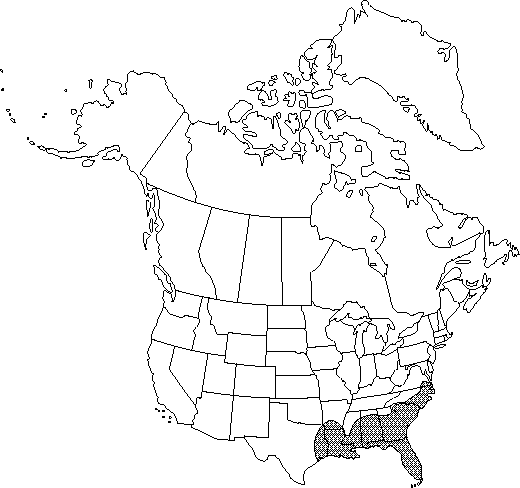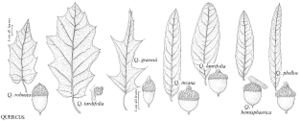Quercus laurifolia
Hist. Chênes Amér., no. 10, plate 17. 1801.
Trees, tardily deciduous, to 40 m. Bark dark-brown to black, ridges flat, furrows deep. Twigs redbrown, (1-) 1.5-2.5 mm diam., glabrous. Terminal buds dark redbrown, ovoid to subconic, 2.5-6 mm, distinctly 5-angled in cross-section, glabrous or with tuft of reddish hairs at apex. Leaves: petiole 1.5-5 mm, glabrous. Leaf-blade rhombic or broadly elliptic to obovate, occasionally oblong or spatulate, 30-120 × 15-45 mm, thin, base attenuate or cuneate, rarely obtuse, margins entire with 1 apical awn, apex obtuse or rounded; surfaces abaxially glabrous, adaxially glabrous, veins raised. Acorns biennial; cup shallowly saucer-shaped to deeply bowl-shaped, 3.5-9 mm high × 11-17 mm wide, covering 1/4-1/2 nut, outer surface puberulent, inner surface pubescent at least 1/2 distance to rim, scale tips appressed, acute or attenuate; nut globose or ovoid, 8.5-16 × 10-16 mm, glabrate, scar diam. 6.5-11.5 mm.
Phenology: Flowering spring.
Habitat: Sandy flood plains and bottoms, riverbanks, and terraces, occasionally on poorly drained uplands
Elevation: 0-150 m
Distribution

Ala., Ark., Fla., Ga., La., Miss., N.C., S.C., Tex., Va.
Discussion
Quercus laurifolia apparently flowers two weeks earlier than sympatric Quercus hemisphaerica (W. H. Duncan and M. B. Duncan 1988). It reportedly hybridizes with Q. falcata, Q. incana, and Q. nigra (H. A. Fowells 1965); with Q. hemisphaerica, Q. marilandica, Q. myrtifolia, Q. phellos, and Q. shumardii (D. M. Hunt 1989); and with Q. velutina.
Selected References
None.
